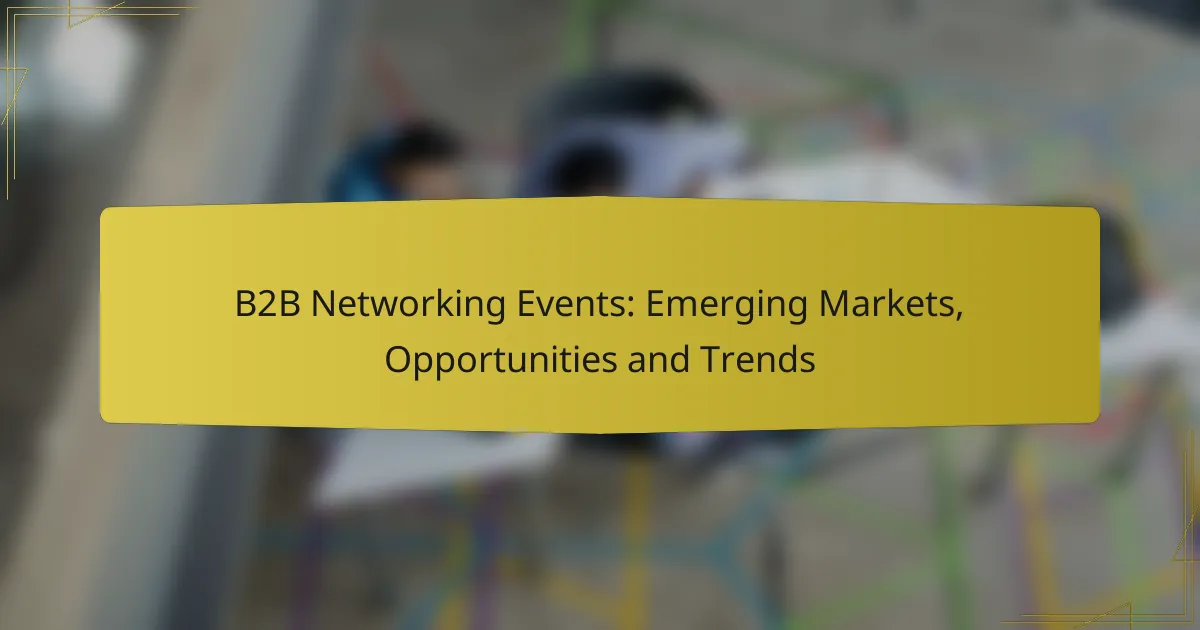B2B networking events in emerging markets play a vital role in helping businesses expand their reach and forge valuable connections. These gatherings not only facilitate interactions among industry leaders and potential clients but also drive collaboration and innovation through shared insights and partnerships. As technology evolves, these events are adapting with trends like virtual platforms and a focus on sustainability, making them essential for navigating the dynamic landscape of emerging markets.
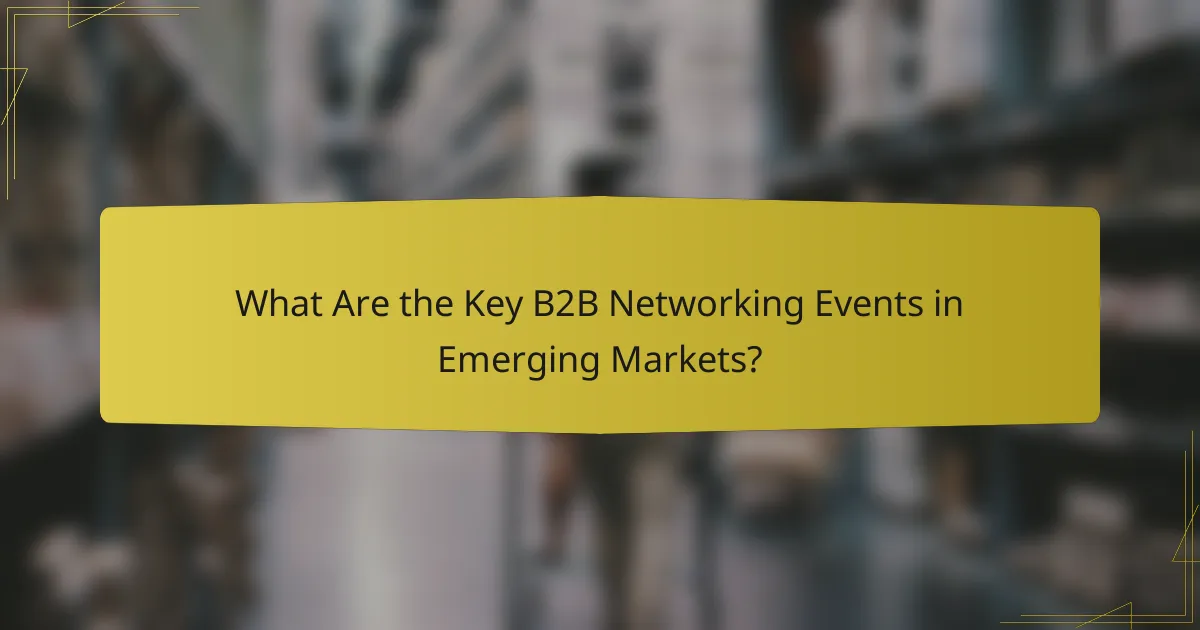
What Are the Key B2B Networking Events in Emerging Markets?
B2B networking events in emerging markets are crucial for businesses looking to expand their reach and establish connections. These events facilitate interactions among companies, industry leaders, and potential clients, fostering collaboration and growth opportunities.
Trade Shows
Trade shows are large-scale events where businesses showcase their products and services to potential clients and partners. In emerging markets, these events often attract a diverse audience, providing opportunities for direct engagement and lead generation.
When attending trade shows, consider the industry relevance and the expected attendance. Research past events to gauge their success and the types of businesses that participate. For example, a technology trade show in Southeast Asia may feature startups alongside established firms, creating a rich networking environment.
Conferences
Conferences focus on specific industries or themes, offering a platform for knowledge sharing and networking. They typically include keynote speakers, panel discussions, and breakout sessions that facilitate deeper engagement among participants.
To maximize benefits from conferences, identify those that align with your business goals. Look for events that feature influential speakers or industry leaders. Participating in Q&A sessions can also enhance visibility and foster connections.
Workshops
Workshops provide hands-on learning experiences and are often smaller than trade shows or conferences. They allow participants to engage in practical exercises and discussions, making them ideal for skill development and networking.
Choose workshops that offer relevant content and opportunities for interaction. For instance, a workshop on digital marketing strategies in Latin America can help businesses learn and connect with local experts and peers.
Webinars
Webinars are online events that allow businesses to connect with a global audience without geographical constraints. They typically feature presentations followed by interactive Q&A sessions, making them accessible and cost-effective.
To leverage webinars effectively, select topics that resonate with your target audience. Promote your participation through social media and email campaigns to attract attendees. Engaging with participants during Q&A can lead to valuable connections.
Networking Mixers
Networking mixers are informal gatherings designed to encourage relationship building among professionals. These events often take place in relaxed settings, making it easier for attendees to connect and share ideas.
When attending networking mixers, focus on building genuine relationships rather than just exchanging business cards. Prepare a brief introduction about your business and be open to discussing others’ interests. This approach can lead to meaningful connections and potential collaborations.
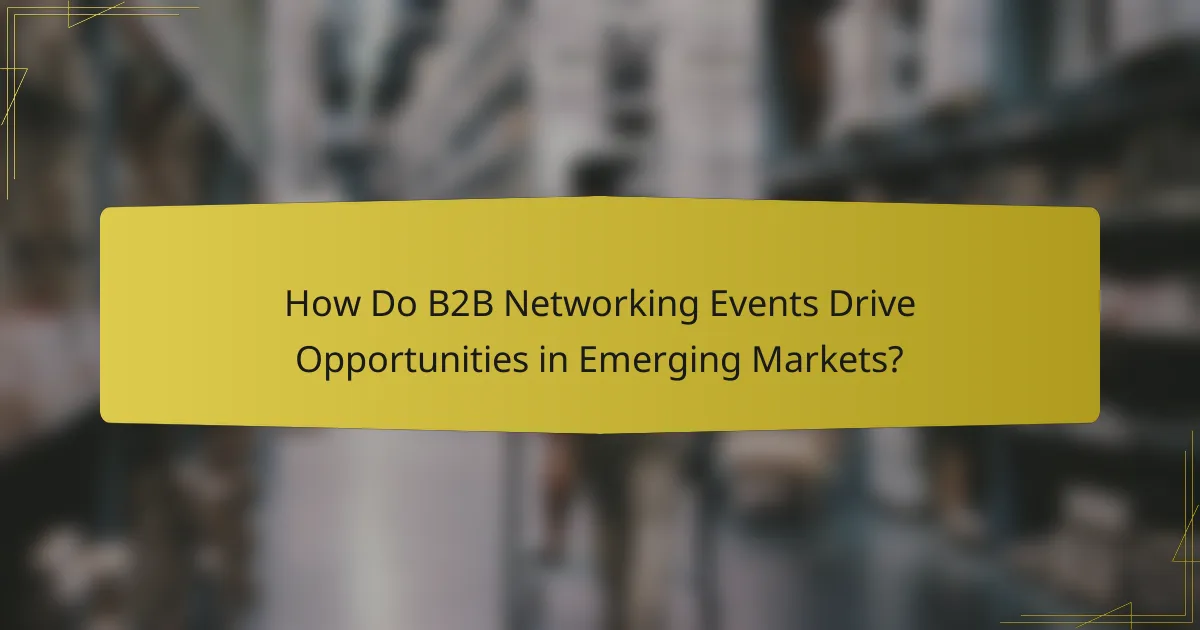
How Do B2B Networking Events Drive Opportunities in Emerging Markets?
B2B networking events are pivotal in creating opportunities within emerging markets by facilitating connections, fostering partnerships, and providing valuable market insights. These gatherings enable businesses to engage directly with potential clients, partners, and industry leaders, ultimately driving growth and innovation.
Access to New Markets
Networking events allow businesses to tap into new markets by connecting with local stakeholders and understanding regional dynamics. Attendees can gain firsthand knowledge about consumer preferences and regulatory environments, which is crucial for market entry strategies.
For example, a tech firm from the U.S. attending a conference in Southeast Asia can meet local distributors and learn about market demands, helping them tailor their products effectively. This direct interaction often leads to quicker market penetration compared to traditional research methods.
Partnership Development
Establishing partnerships is a key benefit of B2B networking events, as they bring together diverse companies seeking collaboration. These events create an environment conducive to forming strategic alliances, joint ventures, or distribution agreements.
For instance, a manufacturing company might find a local partner who understands the logistics and regulatory landscape, significantly reducing barriers to entry. Engaging in discussions during these events can lead to mutually beneficial arrangements that enhance competitiveness in emerging markets.
Market Insights
Networking events provide invaluable market insights through presentations, panel discussions, and informal conversations. Participants can learn about industry trends, consumer behavior, and competitive landscapes directly from experts and peers.
Attending a workshop on digital marketing strategies in Latin America, for example, can equip businesses with the knowledge to adapt their approaches to local audiences. This real-time information is often more relevant and actionable than secondary research, allowing companies to make informed decisions quickly.

What Trends Are Shaping B2B Networking Events?
B2B networking events are increasingly influenced by technological advancements, evolving participant expectations, and a growing emphasis on sustainability. Key trends include the rise of virtual networking platforms, hybrid event formats, and a focus on environmentally friendly practices.
Virtual Networking Platforms
Virtual networking platforms have transformed how businesses connect, allowing participants to engage from anywhere in the world. These platforms often feature tools for video conferencing, chat rooms, and virtual booths, making it easier to facilitate meaningful interactions.
When selecting a virtual platform, consider user experience, accessibility, and integration capabilities with other tools. Popular options include Zoom, Hopin, and Remo, each offering unique features tailored to different networking needs.
Hybrid Event Formats
Hybrid event formats combine in-person and virtual elements, catering to a broader audience. This approach allows businesses to reach local attendees while also engaging international participants who prefer online interaction.
To successfully implement a hybrid format, ensure seamless technology integration and provide equal engagement opportunities for both in-person and virtual attendees. Consider using live streaming, interactive Q&A sessions, and networking lounges to enhance the experience for all participants.
Focus on Sustainability
There is a growing emphasis on sustainability in B2B networking events, driven by both consumer demand and regulatory pressures. Organizers are increasingly adopting eco-friendly practices, such as reducing waste, sourcing local materials, and utilizing digital resources to minimize environmental impact.
To incorporate sustainability, consider implementing measures like digital ticketing, catering from local vendors, and providing recycling options at venues. These practices not only reduce the carbon footprint but also resonate with environmentally conscious attendees, enhancing your brand’s reputation.
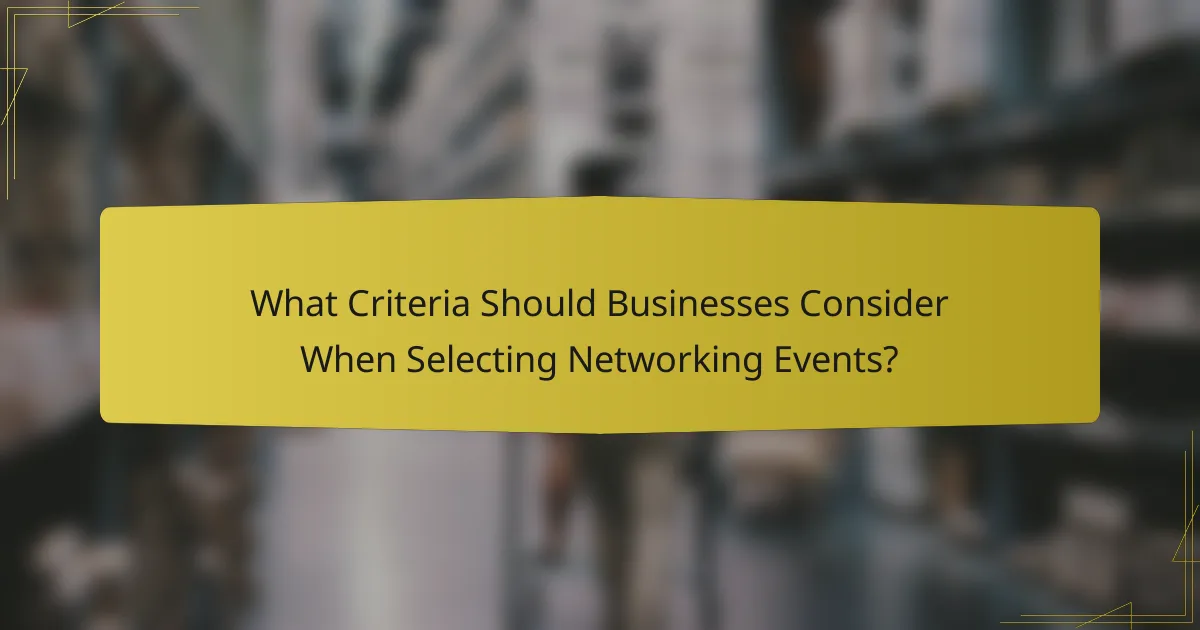
What Criteria Should Businesses Consider When Selecting Networking Events?
Businesses should consider factors such as target audience, event reputation, and cost versus value when selecting networking events. These criteria help ensure that the event aligns with their goals and provides meaningful opportunities for connection and growth.
Target Audience Alignment
Understanding the target audience is crucial for effective networking. Businesses should evaluate whether the attendees include potential clients, partners, or industry influencers relevant to their objectives. For example, if a tech startup is seeking partnerships, events focused on innovation and technology would be more beneficial than general business expos.
Consider the demographics and professional backgrounds of the participants. Events that attract a specific niche, such as sustainable energy or fintech, can provide more valuable connections than broader gatherings.
Event Reputation
The reputation of a networking event can significantly impact its effectiveness. Research past events to determine the quality of speakers, attendees, and overall organization. Look for testimonials or reviews from previous participants to gauge the event’s credibility.
Established events often attract higher-profile attendees and sponsors, which can enhance networking opportunities. For instance, a well-known industry conference may offer more valuable connections than a lesser-known local meetup.
Cost vs. Value
Evaluating the cost versus the potential value of attending a networking event is essential. Consider registration fees, travel expenses, and accommodation costs in relation to the benefits gained, such as new leads or partnerships. A high ticket price may be justified if the event promises significant networking opportunities with key industry players.
Businesses should also assess the return on investment (ROI) from previous events. Tracking outcomes like new contacts made or deals closed can help in making informed decisions about future participation. Aim for events where the potential benefits clearly outweigh the costs involved.
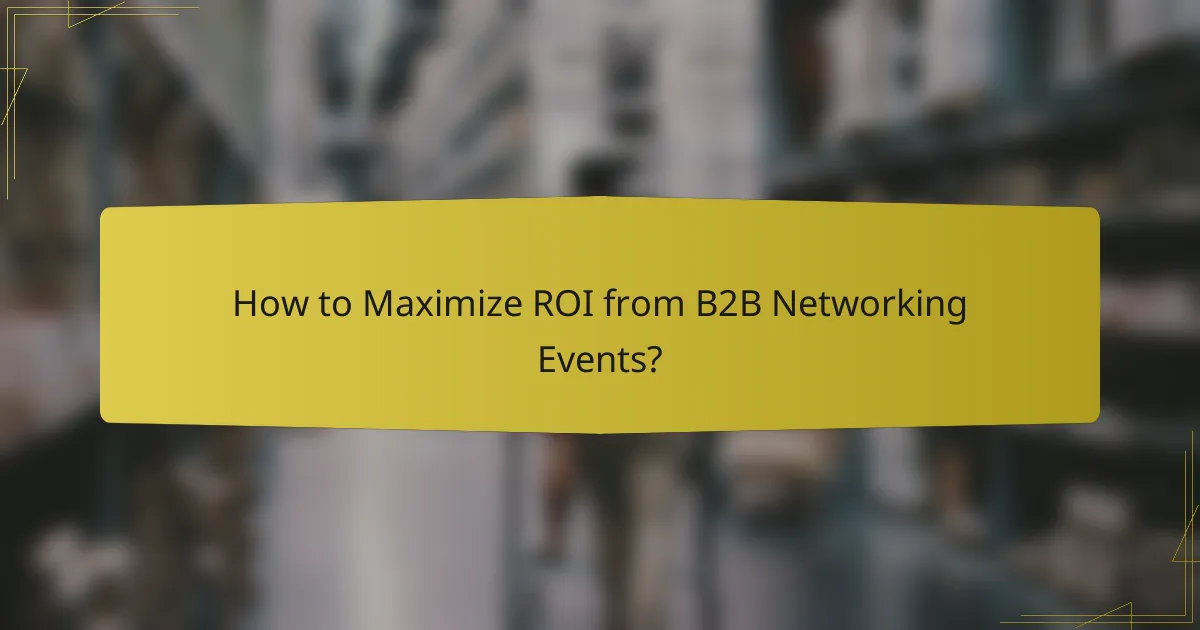
How to Maximize ROI from B2B Networking Events?
To maximize ROI from B2B networking events, focus on strategic planning, effective engagement during the event, and diligent follow-up afterward. By aligning your objectives with actionable strategies, you can enhance your connections and drive business growth.
Pre-Event Planning
Effective pre-event planning is crucial for maximizing ROI. Start by defining clear objectives, such as generating leads, building partnerships, or increasing brand awareness. Identify the right events that align with these goals and research attendees to tailor your approach.
Consider creating a checklist that includes tasks like booking travel, preparing marketing materials, and scheduling meetings with key contacts. This ensures you are organized and ready to make the most of your time at the event.
Follow-Up Strategies
Following up after a networking event is essential for converting connections into business opportunities. Aim to reach out within a few days, ideally through personalized emails that reference your conversation. This helps reinforce the relationship and keeps your business top-of-mind.
Utilize a CRM system to track interactions and set reminders for follow-ups. This organized approach can significantly improve your chances of turning initial contacts into lasting partnerships.
Engagement During Events
Active engagement during networking events can significantly enhance your ROI. Approach conversations with a genuine interest in others’ needs and challenges, which fosters stronger connections. Use open-ended questions to encourage dialogue and discover potential collaboration opportunities.
Participate in workshops or panel discussions to showcase your expertise and attract like-minded professionals. Additionally, consider using social media to share insights and connect with attendees in real-time, amplifying your presence at the event.
